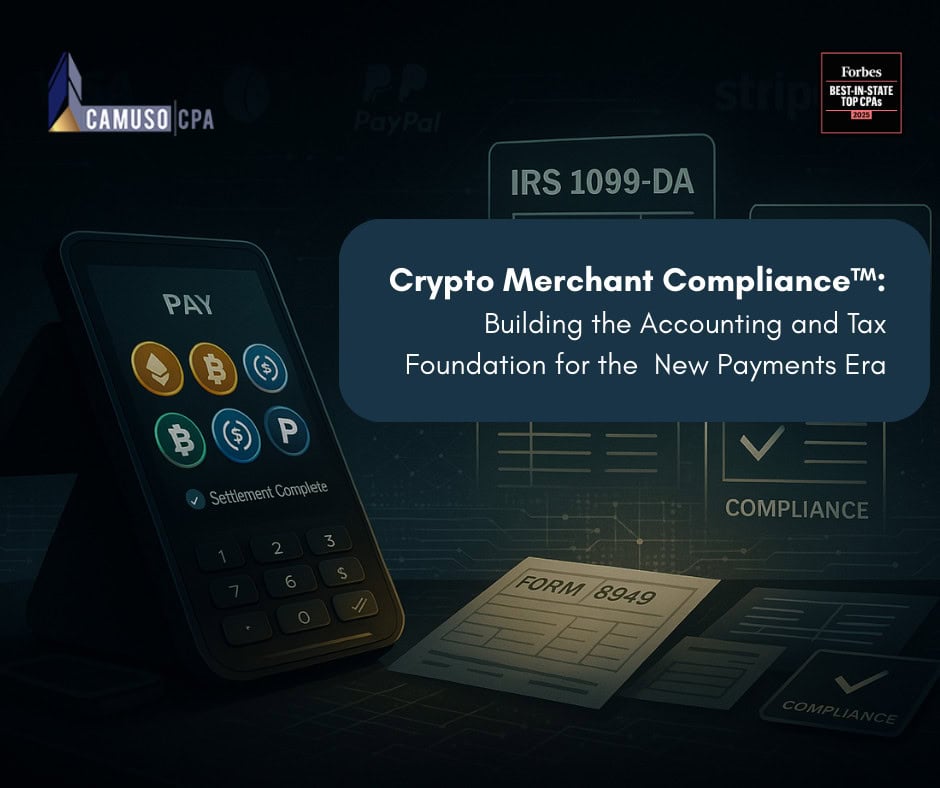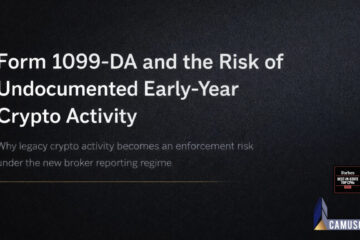Last Updated on September 19, 2025 by Patrick Camuso, CPA
Crypto Merchant Compliance: The Payments Shift No Merchant Can Ignore
Stablecoin commerce is no longer theoretical. PayPal has launched PYUSD. Stripe is piloting stablecoin settlement. Visa and Mastercard are testing blockchain payment rails. Shopify merchants can now enable crypto checkouts through Coinbase Commerce and similar platforms.
This is the beginning of a structural change in global payments. For merchants, it promises lower costs, faster settlement, and access to new markets. But it also signals something more important: mainstream regulatory oversight is arriving alongside mainstream adoption.
Most businesses are not prepared. They lack an accounting architecture, an audit trail, and a tax strategy that can withstand scrutiny. That’s why we built Crypto Merchant Compliance™, the first integrated framework for merchants operating in the digital asset economy.
At Camuso CPA, recently recognized by Forbes as a Best-in-State Top CPA, we have been leading the charge in crypto accounting since 2016. Our work includes publishing the industry’s first book on NFT sales taxes, teaching national CPE courses about on-chain commerce, and designing tax plans and accounting systems for web3 commerce and marketplaces.
The Rise of Stablecoin Commerce
Stablecoins have moved from the periphery of digital assets to the center of commerce. PayPal’s PYUSD, Stripe’s settlement rails, and Visa and Mastercard pilots now allow transactions in digital dollars with the same ease as credit cards. Coinbase Commerce and Shopify integrations are embedding stablecoin payments directly into consumer checkout flows. What looked experimental two years ago is fast becoming infrastructure.
For merchants, this shift is both an opportunity and a risk. On one hand, stablecoin rails reduce friction and expand global reach. On the other, they introduce accounting and tax challenges that traditional systems are not designed to handle:
- Reconciling across systems including payment processor dashboards, on-chain wallets, and accounting software rarely align cleanly.
- Settlement tracking across stablecoin conversions into fiat or transfers across platforms must be logged with precision.
- Tax implications are complex even for “stable” assets can since they can generate taxable gains, sales taxes, FX adjustments, and complex reporting requirements.
The misconception is that “stable” means simple. In practice, stablecoin payments create an audit trail that is as complex as it is transparent. Regulators understand this and both the IRS and state tax authorities are already watching closely.
Learn more about our Tax Planning Services.
Why Sales Tax is Only the Beginning
Most Web3 and NFT merchants are already non-compliant. Sales tax rules apply to digital goods just as they do to physical ones, yet thousands of NFT projects and tokenized commerce platforms ignore them. States have begun to pay attention, and enforcement is no longer a distant risk.
Merchants adopting stablecoin rails are next in line. As PayPal, Stripe, and Coinbase Commerce integrate crypto into mainstream checkouts, regulators will expect the same rigor they demand of fiat processors. Without proper sales tax mapping, sourcing rules, and jurisdictional controls, merchants face exposure.
This is not theoretical. I wrote the book on NFT sales taxes and have trained accountants nationwide on this topic through continuing education. The conclusion is clear, most merchants are already behind, and compliance gaps are widening.
And sales tax is only step one. Merchants also face:
- Income tax treatment of digital asset revenue.
- Classification of NFTs and tokenized goods.
- Cross-border compliance (VAT, GST, MiCA).
- 1099-DA reporting and digital asset disclosure mandates.
Without a comprehensive framework, the risks compound into penalties, double taxation, and failed audits.
Learn more about our Web3 Sales Tax Services.
The Crypto Merchant Compliance™ Framework
Crypto Merchant Compliance™ is designed as a complete system, aligning accounting, tax, and regulatory functions into one integrated architecture:
- Accounting Architecture: Wallet segregation, clean sub-ledgers, integrated accounting, reconciliation across PayPal, Stripe, and Coinbase Commerce.
- Tax Optimization : SegFIFO™ lot tracking, on-chain sales tax mapping, and multi-entity structuring for both compliance and efficiency.
- Regulatory Readiness : Audit-ready binders and compliance calendars.
- Growth Enablement: Clean systems that unlock banking, support investor due diligence, and meet licensing requirements.
Learn how our Web3 Accounting Services help blockchain enabled businesses stay compliant.
Case Snapshot
Consider a crypto e-commerce merchant selling both NFTs and physical products. Initially, their wallets were disorganized, sales tax filings were nonexistent, and income reporting was incomplete. Investor diligence stalled.
After implementing Crypto Merchant Compliance™:
- Wallets were reconciled using ChainRecon™ and integrated into a comprehensive accounting system.
- Sales tax and income recognition were properly mapped.
- An audit-ready compliance binder was produced.
- The merchant avoided more than $250,000 in in sales tax exposure and reopened the door to VC funding.
This is not an exception, it is the emerging standard.
Why Merchants Cannot Wait
Stablecoin adoption is accelerating now, not in five years. Regulatory enforcement has already begun with 1099-DA reporting and heightened state oversight. Merchants who act now position themselves as Crypto-Ready Merchants, signal credibility to investors, banks, and customers. Those who delay will find themselves reacting to audits, penalties, and missed opportunities.
The future of commerce is being built on-chain. Merchants who adopt compliance as infrastructure will scale with confidence; those who treat it as an afterthought will be left behind.
At Camuso CPA, we’ve been setting the standard for crypto accounting since 2016. Recognized by Forbes, trusted by founders and investors, and powered by proprietary systems, we deliver the only complete compliance program designed for merchants in the digital asset economy.






